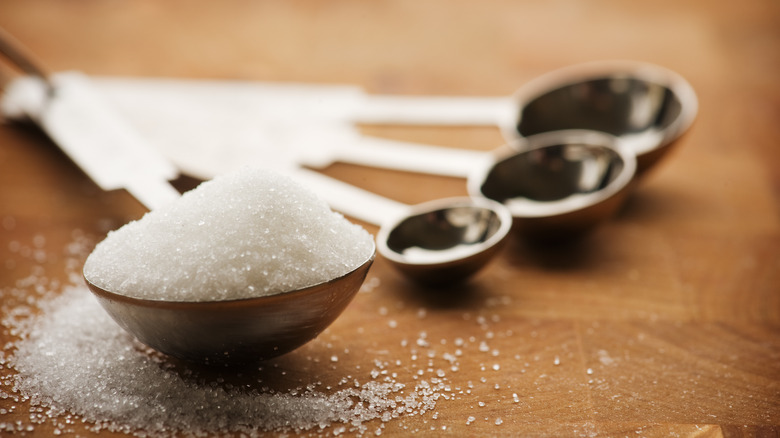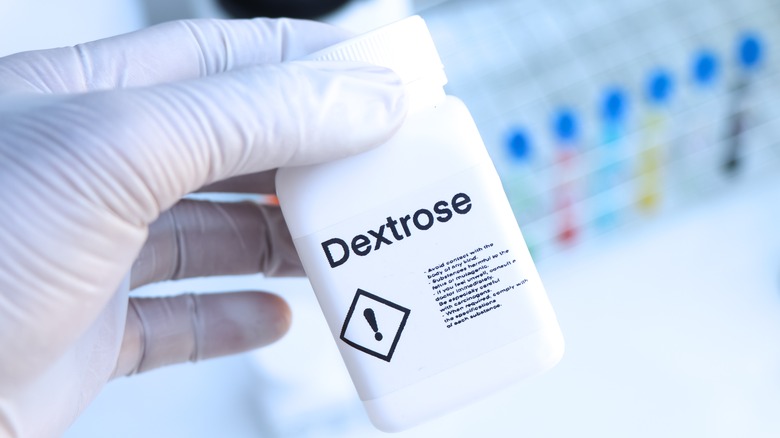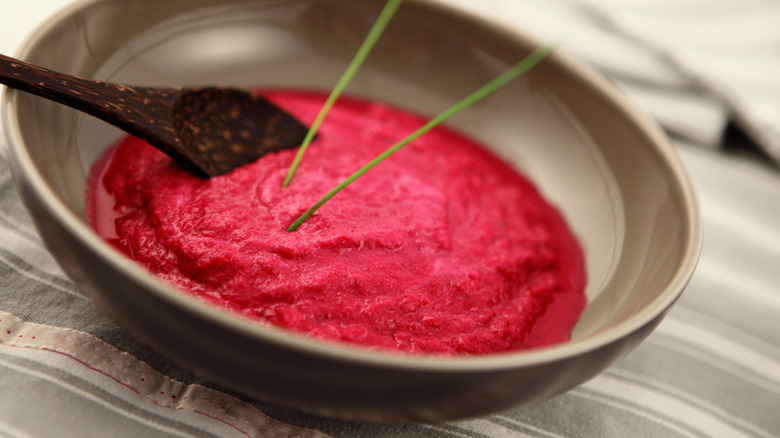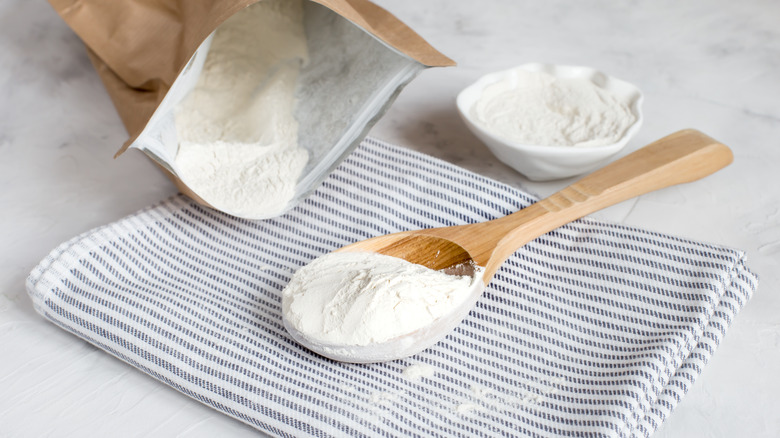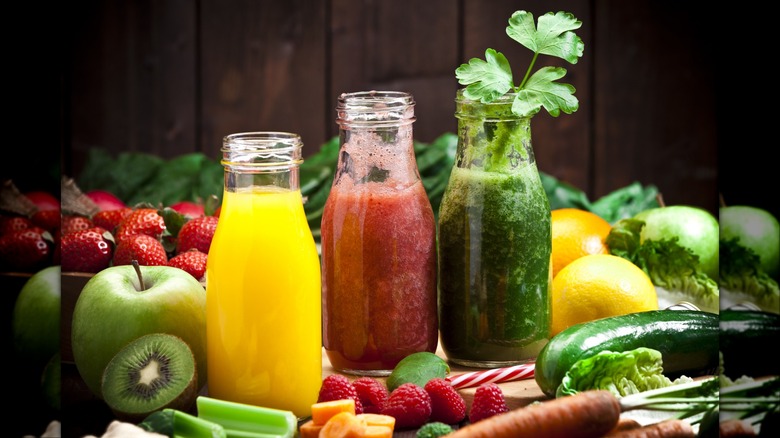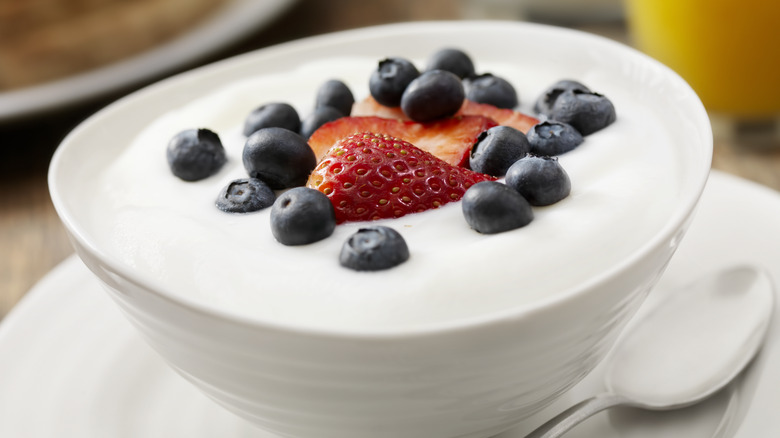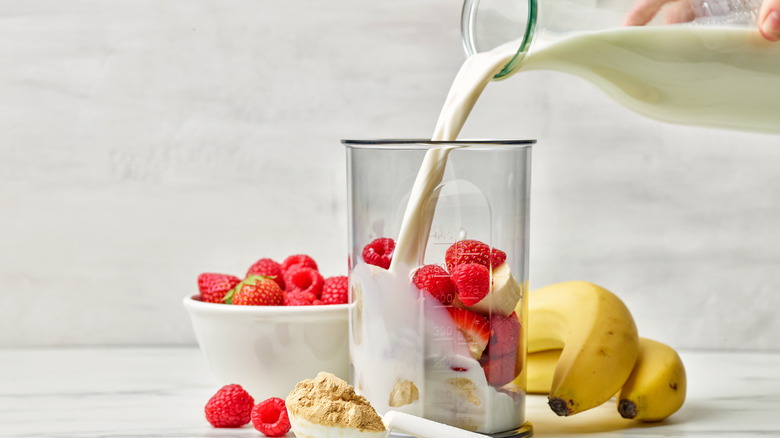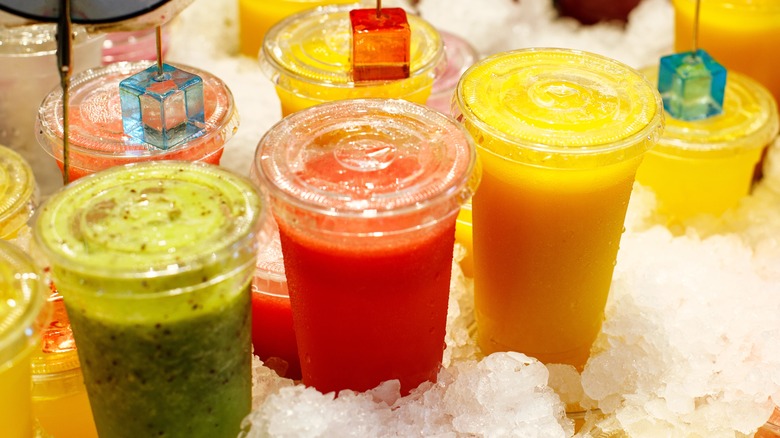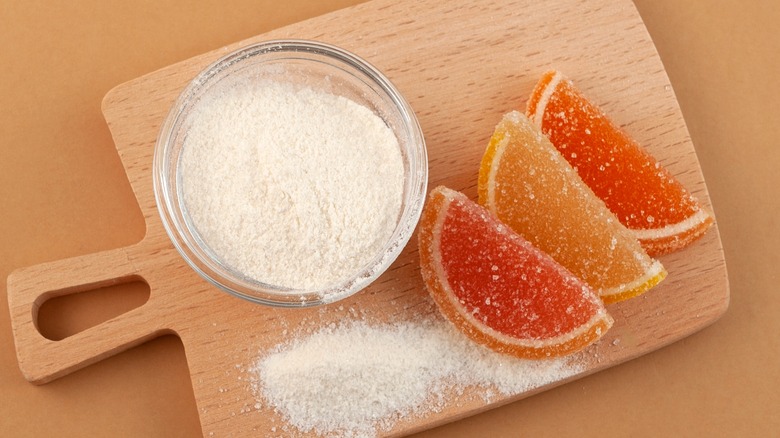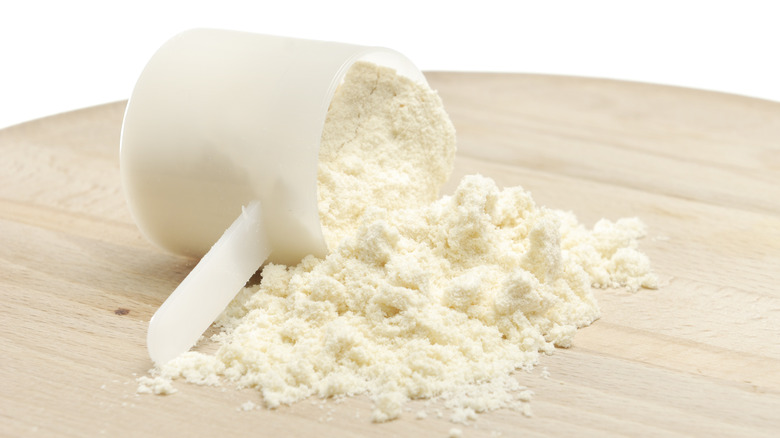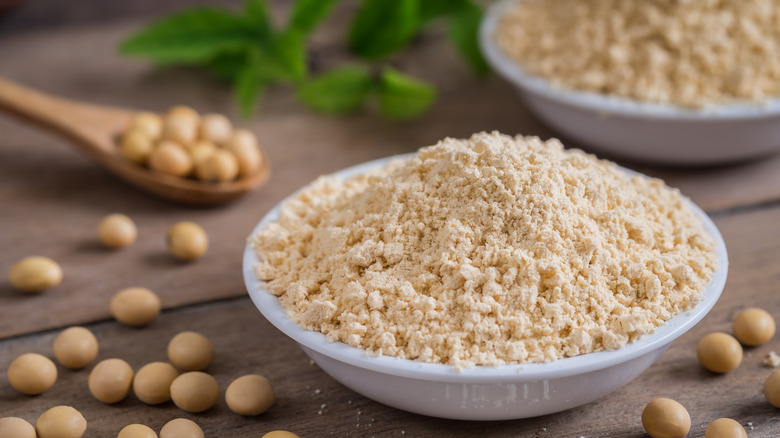What's Actually In Fast Food Smoothies?
Quick, fruity, and refreshingly delicious? Sounds like our kind of drink! Smoothies are one of the healthiest "sweet" drinks you can get your hands on, but you'll need to be careful about where you pick up your next fruity swig. While decadently healthy and delicious, fast food smoothies can sometimes come off a bit deceitful, especially considering that they often contain a little more than the average milk and fruit concoction you might be accustomed to.
As with most items on the fast food menu, there's definitely more than meets the eye, especially when it comes to your traditionally healthy smoothie drink. Ingredients that supposedly "enhance" flavors abound, and you might just be surprised about what exactly is lurking in your cup of creamy deliciousness.
In this article, we're working to unmask some of the sneaky components that may get added to your smoothie, while also revealing the natural and wholesome ingredients that fast food chains still utilize to maintain all that fresh fruity flavor. So, if you're ready, join us as we take a whirl at some of the ingredients you may find in your next fast food smoothie.
Artificial flavoring
First up on our list of ingredients you'll (potentially) find in your fast food smoothie is artificial flavoring. Thankfully, we haven't found as many restaurants whipping out smoothies with fake flavoring the way we thought we would. Some restaurants, like McDonald's and Dairy Queen, still feature the faux flavors despite the undoubtedly tasty essence that natural fruits already provide. What exactly those flavors are, we aren't sure, as McDonald's doesn't make an effort to list what specific additives they use to mimic the real thing.
You may wonder why places like Mickey D's would even attempt to use artificial flavors in a drink like this at all. Beats us. After all, most fresh homemade smoothie recipes call for basic fruit ingredients along with milk and a bit of sweetener to make things plenty tasty. Nevertheless, McDonald's has chosen to supply its customer base with unnecessary additives, presumably to make its smoothies taste "better" than they would have.
Given the controversy surrounding artificial food additives, we really do wish certain fast food chains would leave well enough alone when it comes to good food. Still, we haven't seen places like Jamba Juice, Smoothie King, or many other fast food restaurants adding artificial flavoring to their smoothies, and therefore it really doesn't seem to be a very popular trend.
Sugar
This may not come as a surprise, but you'll usually find sugar added to your smoothie drink, even though we must attest that it really isn't necessary. However, we know that for most fast food restaurants, potent flavor is a must, and thus, manufacturers may feel the need to kick things up a notch by using flavor enhancers like sugar to make menu items like smoothies taste as delightful as possible.
Honestly? We get it. Dairy Queen's Orange Julius is nothing short of marvelous, and we aren't surprised that the drink packs 62 grams in a medium-sized order. What we don't know is how much of that sugar is "table sugar" and how much of it is sugar from the orange juice it contains. Either way, we know that 62 grams of sugar exceeds the recommended daily amount of sugar intake for adults, so this drink definitely has the potential to lead to health complications, such as cardiovascular disease, diabetes, and cancer, down the road if consumed too regularly (via American Heart Association). Other smoothies that contain tons of sugar? Take your pick. Added sugar abounds in smoothies from places like Baskin-Robbins, certain smoothies purchased from Tropical Smoothie Cafe, and more.
Dextrose
If you've never heard of dextrose before, allow us to introduce you. Dextrose is a substance often used as an additive in food. Its purpose is to sweeten food while also balancing out salty or spicy flavors. In addition, dextrose is sometimes used to preserve foods and is used in processed foods often due to its versatility.
With this information in mind, it isn't hard to imagine why fast food chains may opt to add dextrose to their smoothies. Though it serves as a sweetener, we think it is just as unnecessary as table sugar, if not more so. It causes sharp spikes in insulin which doctors may use to their advantage when it comes to assisting patients with low blood sugar (via WebMD). However, this additive isn't so convenient when it comes to those who may already struggle with high blood sugar issues (via Healthline).
Yes, we know that additives are simply a fact of life, especially when it comes to the fast food industry. But considering that many other fast food smoothie companies don't use this additive (think Jamba Juice and Smoothie King), we think it's better left out of smoothie ingredient lists.
Fruit purée
Thus far, you've probably been frustrated with the ingredients often found in smoothies, and trust us, we're right there with you. But there are also many wholesome ingredients swirled into your refreshing drink that provide both flavor and much-needed nutrition. Fruit purée is one of those that we commonly see used in fast food smoothies. This concentrated mash-up of fruits adds a robust flavor to your drink, but that's not all. Many fast food companies also add whole fruits to your smoothie, just as you would if you were whipping up a delicious smoothie at home.
So, which restaurants have wholesome fruits in their smoothies? Many, we're happy to report. Dairy Queen adds guava, strawberry, and banana purée to its fruit blend. McDonald's, though also relying on artificial ingredients to enhance its smoothie flavor, at least uses strawberry and banana purée. In fact, these two ingredients are listed first on the list of ingredients in the Strawberry Banana McDonald's Smoothie, which definitely makes us happy to see.
Of course, you'll find places like Smoothie King offering a plethora of whole fruit and purée options, some of which include wild blueberries, goji berries, pineapple, and more. Oh, and don't forget that some places like Smoothie King also offer several vegetable-based ingredients for even more nutritional value. Options like kale, carrot, and organic spinach, though not added to all fast food smoothies, are definitely great picks if your local establishment offers them.
Xanthan gum
Xanthan gum is an additive often used in foods as a thickener in liquids and baking products. It is utilized in gluten-free baking recipes and other processed products that may require stabilizing and thickening. It comes from fermented sugar and is a slime-like solution (hence its ability to thicken).
As you may have guessed, you can find xanthan gum in many of your fast food smoothie offerings. McDonald's and Dairy Queen both list this compound as an ingredient in smoothies, most likely to help make them appear thicker. Still, the Baskin-Robbins Mango Smoothie and other fast food smoothie types seem to have successfully avoided this additive, meaning it probably isn't always necessary, especially when other thickening ingredients are used. Having said that, there don't seem to be any major concerns connected to the consumption of xanthan gum, though it may cause digestive issues in some people, especially when consumed in excess (via Healthline).
Fruit and vegetable juice
Much to our liking, fruit and vegetable juices are often used to sweeten fast food smoothies. Though many fast food establishments seem to love adding artificial additives to their smoothie drinks, we're pleased to see fruit and vegetable juice added as a source of natural and nutritive sweeteners.
So, what kinds of veggie and fruit juices are found out there in the fast food smoothie world? Take your pick. At your average run-of-the-mill chain, like McDonald's, you can find a variety of juice types, depending on the flavor of the smoothie. Dairy Queen uses orange juice and passion fruit for its Strawberry Banana Smoothie, while lemon juice is used in the Baskin-Robbins Mixed Berry smoothie.
Oh, and in case you thought fruit and vegetable juices only worked for adding more depth of flavor to a drink, think again. Manufacturers also rely on these juices to help give your smoothie added color in a more natural way than the usual artificial coloring sometimes used in other beverages on your average fast food menu.
Yogurt
Creamy yogurt in a fast food smoothie? Now, that's how it's done. We know that most homemade smoothie recipes call for dairy of some sort, and yogurt is one of those dairy products that can make a smoothie just right. With its thick and distinct tang, it elevates the drink from simply fruity to something deliciously unique.
Do we expect all fast food chains to include yogurt as a wholesome addition to their smoothies? Not hardly. Surprisingly, though, we've found several chains that include it, and it isn't only your traditional Jamba Juice sort. Actually, Dairy Queen's Strawberry Banana Premium Fruit Smoothie contains yogurt, and it is seemingly packed with the good stuff. It's got several active cultures in it, including Lactobacillus bulgaricus and others, making it at least one healthy addition to a smoothie that's otherwise swirled with sugar and additives.
Are there any other fast food smoothies featuring yogurt as a component of their ingredient list? Yes, actually. McDonald's Strawberry Banana Smoothie also contains yogurt, though we aren't too keen on the ingredients in this particular yogurt type. It has active cultures in it, sure, but it also contains modified food starch, fructose, and corn starch. No, these ingredients won't make you keel over at first sip, but they also aren't ingredients we typically see in the average yogurt sold in markets. Take it for what it's worth!
Milk
As mentioned before, smoothies often contain dairy of some sort, with some featuring yogurt and others not. In the case of smoothies that don't feature yogurt, there's one thing that can still make them creamy, smooth, and delicious — milk. Yes, even with yogurt smoothies, milk tends to make an appearance at some point even when it comes to smoothies made at home. We also see this ingredient when scoping out fast food smoothies, although some joints may choose to leave it out intentionally.
While restaurants like Smoothie King definitely mix milk into their smoothies, other chains, like Baskin-Robbins, take a step back on purpose. Several Baskin-Robbins smoothies are intentionally made dairy-free, which makes them a really great grab for people who are avoiding milk products for their own reasons. In addition, you should note that several companies, Jamba Juice included, offer soymilk as a base to give people with different dietary needs an opportunity to satisfy their cravings without needing to compromise their food preferences to do so.
Wood pulp (cellulose powder)
Wood pulp? You've got to be kidding, right? Not really. Cellulose is a naturally occurring element that is derived from several sources, and yes, wood pulp is one of them. It is used as a thickener in products and can be readily found in products like cheese to keep it from clumping.
So, what's it doing in your smoothie, you ask? Likely the same thing. Cellulose powder is used as a thickener in smoothies, though we're happy to report that you probably won't see this icky ingredient pop up much in the world of creamy fruit. Thus far, we've only seen it listed in McDonald's ingredients, but places like Dairy Queen, Baskin-Robbins, Tropical Smoothie Cafe, and more seem to be steering clear of the stuff, opting for xanthan gum (or another thickening agent) instead. For this we're glad ... we'd rather not sip on wood pulp if we can help it.
Preservatives
Ah, preservatives. We know they're so wrong, but they make their way into nearly everything for good reason. Obviously, preservatives do just what they sound like they do; they work to preserve the flavor and quality of the foods we eat by keeping bacteria at bay. Foods that contain preservatives are generally recognized as safe by the FDA, though some types may pose concerns related to carcinogenic risk depending on the preservative type.
We noticed that some restaurants choose to use preservatives, and some do not. To be specific, Smoothie King isn't using them at the time of this publication. Of course, McDonald's smoothies contain them, but that should really come as no surprise given the other additives we've already mentioned that show up in Mickey D's smoothies as well. Jamba Juice also features ascorbic acid in some of its drinks, which kind of shocked us as this is usually one of the chains with "cleaner" ingredients.
Though we know preservatives are often seemingly necessary, in our opinion, the fewer additives in food, the better. Because of this, we're pleased to see that at least some fast food chains have decided not to include this additive in their smoothies, but you need to be careful. If the use of preservatives bothers you, always be sure to look over the ingredient list to be sure.
Pectin
Does this ingredient look familiar? If not, it should. Pectin is used as a thickener in several foods, with jelly and jam being the most common. It's naturally found in citrus, plums, and apples, but when used as an additive, it is usually in its modified state.
As you might assume, you can find pectin in smoothies at your local fast food establishment. This, much like xanthan gum, cellulose, and other compounds, works to make smoothies appear thicker than they would otherwise. And though not all restaurants will feature this thickening agent, you'll likely spot it on Baskin-Robbins and McDonald's smoothie ingredient lists. Jamba Juice also makes use of pectin, likely in a concerted effort to make the smoothies appear irresistibly luscious. And while pectin doesn't tend to pose major health problems for people, some may find themselves sensitive to it. In these cases, symptoms like diarrhea or gas may be experienced by an individual who consumes this ingredient (via WebMD).
Whey protein
Whey protein has a variety of uses, which is why we think it appears often on smoothie ingredient lists. In some cases, the use of whey protein in smoothies is announced up front, which is undoubtedly in response to specific health benefits that customers often go looking for.
In case you're wondering what's so special about whey protein, allow us to fill you in. Whey protein is a shelf-stable alternative to fresh dairy that can boost protein levels in drinks while providing a pleasing milky flavor. Places like Jamba Juice offer whey protein in drinks like their PB & Banana Protein Smoothie, as this helps bolster nutrients and keeps protein-craving individuals happily satisfied. Making a trip to Smoothie King? They also have whey protein options to give your smoothie a lift while also featuring protein-specific drinks to satisfy your dietary needs. Just know that high doses of the stuff can lead to unsavory consequences like acne, thirst, fatigue, and bloating, among other icky side effects (via WebMD).
Soy
Much like whey protein, some people may seek out soy protein for its added benefits. While soymilk can sometimes be found in smoothie drinks (especially in specialty shops like Jamba Juice), it isn't typically the norm unless the company makes an attempt to offer something for its vegan or dairy-free fan base. With that said, soy protein can be found added to Jamba Juice's PB + Banana Protein Smoothie, but this time, in place of whey protein. As mentioned, whey protein adds a boost of protein to smoothie drinks, but soy protein can do the same without the use of dairy. This makes it the perfect option for those who would like to increase their protein intake but avoid dairy in the process.
Want something fruity instead of peanut buttery? No problem. Jamba Juice offers another soy-infused smoothie (the Protein Berry Workout) made of berries, banana, soymilk, and soy protein, making it a fruitier but no less protein-rich option for people who prefer the taste of fresh fruit on their taste buds.


